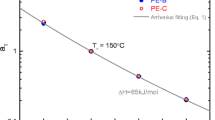Abstract
In polymer melt elongational rheometry only by the rotary clamp technique large elongations can be obtained homogeneously. However, as described in this paper, there still remain disadvantages that led to the development of a new rheometer with the following main features: The dimensions of the required sample are small (60 × 7 × 2 nun3), the sample is supported by a cushion of inert gas and, after having reached the test temperature of up to well above 300°C, it can be extended by a new type of clamps that make use of metal conveyor belts. The resulting tensile force is measured with a resolution of better than 100 mgf (0.001 N). The strain rate range is 0.001-1 s−1, and the maximum Hencky strain is 7, corresponding to a maximum stretch ratio of 1100. Within the sample, the temperature variation in time and space is less than 0.1°C. For the evaluation and documentation of the test performance, a video camera records the top and side views of the sample that carries a marking powder to permit the evaluation of the true strain rate. The operation of the instrument is easy, and so is the sample preparation, but care must be taken concerning the necessary isotropy and ‘internal homogeneity’. Examples of test results are given for several polymer melts at various temperatures: (1) Polystyrene up to a total Hencky strain larger than 7 at 170°C, (2) several types of polyethylene (LDPE, LLDPE, HDPE) at 150°C, (3) poly(amide) at 250°C, and (4) poly(ethersulfone) at 350°C. The wide applicability of the new rheometer is demonstrated by adding results obtained from samples of bread dough. The surface tension has no influence on the results if an error of 3% can be tolerated. From the results it follows that by means of the newly developed rheometer many problems in polymer melt elongation have been solved.
Similar content being viewed by others
References
Ballman RL (1965) Extensional flow of polystyrene melt. Rheol Acta 4:137–140
Cogswell FN (1968) The rheology of polymer melts under tension. Plastics & Polymers 36(4):109–111
Dealy JM (1990) Do polymeric liquids exhibit strain hardening? J Rheol 34:1133–1147
Jenckel E, Ueberreiter K (1938) Ueber Polystyrolgläser verschiedener Kettenlänge. Z physikal Chem A 182:361–383
Gramespacher HF (1993) Einfluß der Grenzflächenspan-nung auf das rheologische Verhalten von Schmelzen aus Polystyrol/Polymethylmethacrylat-Mischungen in Dehnund Scherströmung. PhD thesis Nr. 10179 ETH Zürich
Gubler MG, Kovacs AJ (1959) La structure du polyéthylène considére comme un mélange de n-paraffines. J Polymer Sci 34:551–568
Karam HJ, Bellinger JC (1964) Tensile creep of polystyrene at elevated temperatures. Part I. Trans Soc Rheol 8:61–72
Laun HM, Münstedt H (1978) Elongational behaviour of a low density polyethylene melt. I. Strain rate and stress dependence of viscosity and recoverable strain in the steady state. Comparison with shear data. Influence of interfacial tension. Rheol Acta 17:415–425
Meissner J (1969) Rheometer zur Untersuchung der deformations-mechanischen Eigenschaften von KunststoffSchmelzen unter definierter Zugbeanspruchung. Rheol Acta 8:78–88
Meissner J (1971) Dehnungsverhalten von PolyäthylenSchmelzen. Rheol Acta 10:230–242
Meissner J (1972a) Development of a universal extensional rheometer for the uniaxial extension of polymer melts. Trans Soc Rheol 16:405–420
Meissner J (1972b) Modifications of the Weissenberg rheogoniometer for measurement of transient theological properties of molten polyethylene under shear. Comparison with tensile data. J Appl Polym Sci 16:2877–2899
Meissner J (1985) Experimental aspects in polymer melt elongational rheometry. Chem Eng Comm 33:159–180
Meissner J (1987) Polymer melt elongation - methods, results, and recent developments. Polymer Eng & Sci 27:537–546
Meissner J (1992a) Conventional and new test modes in polymer melt rheometry, Chap 6 (p. 201–230) in: Mitchell J (ed) Applied Polymer Analysis and Characterization. Hanser Publishers Munich
Meissner J (1992b) Experimental problems and recent results in polymer melt rheometry. Makromol Chem, Macromol Symp 56:25–42
Meissner J, Raible T, Stephenson SE (1981) Rotary clamp in uniaxial and biaxial extensional rheometry of polymer melts. J Rheol 25:1–28, 673-674
Meissner J, Stephenson SE, Demarmels A, Portmann P (1982) Multiaxial elongational flows of polymer melts - classification and experimental realization. J Non-Newtonian Fluid Mechanics 11:221–237
Münstedt H, Laun HM (1979) Elongational behaviour of a low density polyethylene melt. 11. Transient behaviour in constant stretching rate and tensile creep experiments. Comparison with shear data. Temperature dependence of the elongational properties. Rheol Acta 18:492–504
Petrie CJS (1979) Elongational Flows. London, Pitman, 254 pp
Raible T (1981) Deformationsverhalten von geschmolzenem Polyäthylen im Zugversuch bei großen Gesamtdehnungen. PhD dissertation Nr. 6751, ETH Zürich
Schwarzl FR (1970) Private communication
Ueberreiter K, Kanig G (1951) Die Kettenlängenabhängig-keit des Volumens, des Ausdehnungskoeffizienten und der Einfriertemperatur von fraktionierten Polystyrolen. Z Naturforsch 6a:551–559
Vinogradov GV, Leonov AI, Prokunin AN (1969) On uniaxial extension of an elasto-viscous cylinder. Rheol Acta 8(4):482–490
Zülle B, Linster JJ, Meissner J, Hürlimann HP (1987) Deformation hardening and thinning in both elongation and shear of a low density polyethylene melt. J Rheol 31:583–598
Author information
Authors and Affiliations
Additional information
Dedicated to Professor Dr. Hermann Janeschitz-Kriegl on the occasion of his 70th birthday.
Rights and permissions
About this article
Cite this article
Meissner, J., Hostettler, J. A new elongational rheometer for polymer melts and other highly viscoelastic liquids. Rheola Acta 33, 1–21 (1994). https://doi.org/10.1007/BF00453459
Received:
Revised:
Issue Date:
DOI: https://doi.org/10.1007/BF00453459




